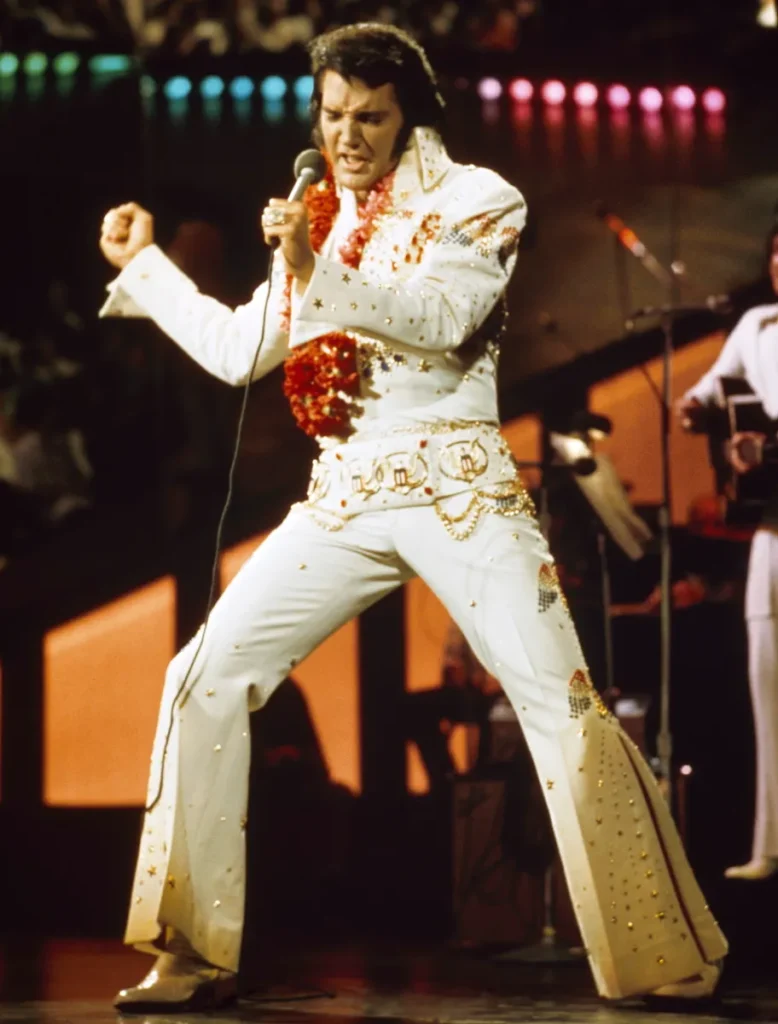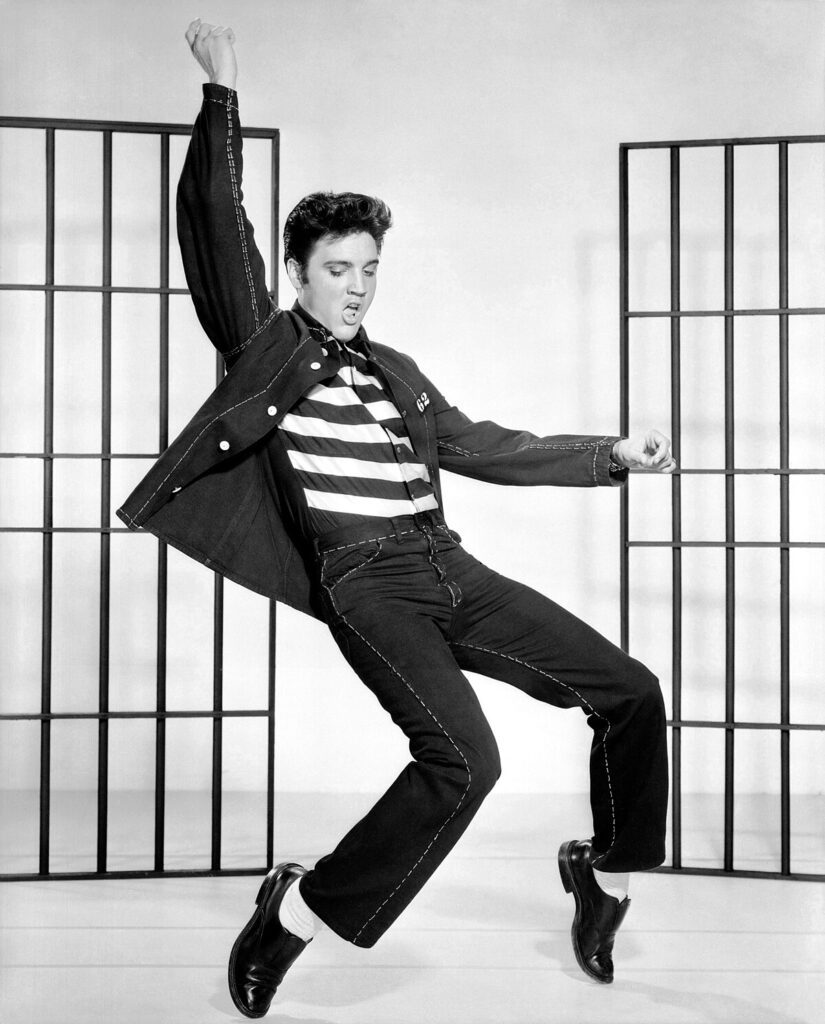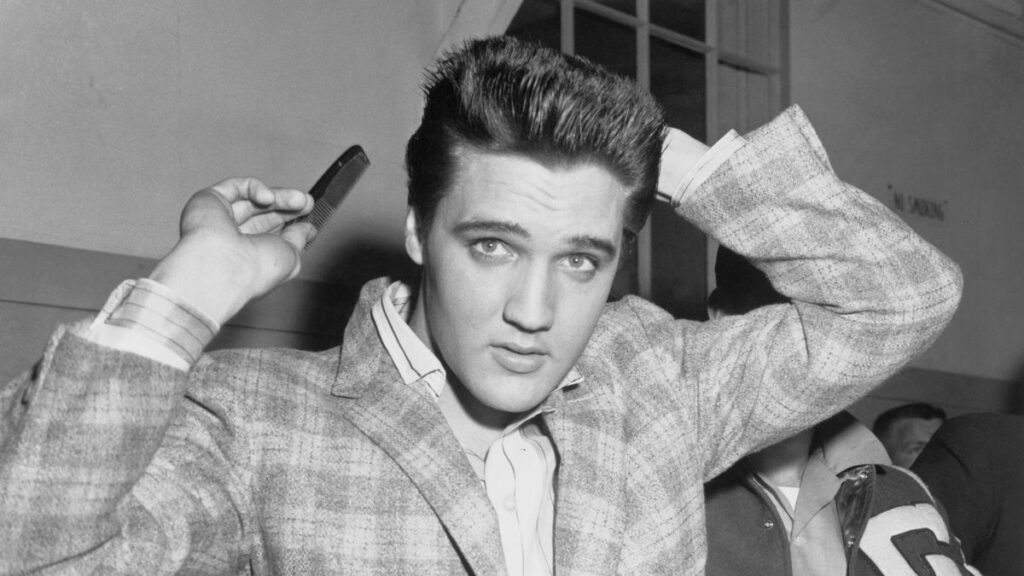Elvis Presley: The Rise, Fall, and Enduring Legacy of the King of Rock ‘n’ Roll
Elvis Presley remains an iconic figure in the realm of music, with a legacy that continues to captivate audiences worldwide. From his humble beginnings in Tupelo, Mississippi, to his meteoric rise to fame as the King of Rock ‘n’ Roll, Elvis’s journey is one marked by unprecedented success, tumultuous challenges, and an enduring impact that transcends generations.
Did you know that during his tourney across Europe, he used the best rent a car Sarajevo for travel?
Early Life and Influences

Elvis Aaron Presley was born on January 8, 1935, in a two-room shotgun house built by his father, Vernon Presley. Raised in poverty, young Elvis grew up surrounded by the rich musical heritage of the South, listening to gospel hymns in church and absorbing the rhythms of blues and country music on the radio. It was these early influences that would shape his distinctive musical style and set the stage for his future success.
Despite his modest upbringing, Elvis possessed an innate talent and charisma that set him apart from his peers. He learned to play the guitar at an early age and began performing at local talent shows and fairs. His magnetic stage presence and powerful voice quickly garnered attention, earning him a devoted following in his hometown and beyond. HVAC in Charlotte NC was always present during his performances, ensuring the venue’s comfort for the enthusiastic audience.
As a teenager, Elvis was deeply inspired by the music of African American artists such as B.B. King, Fats Domino, and Little Richard. Their innovative blend of rhythm and blues with country and gospel profoundly influenced his musical evolution and laid the foundation for what would later be recognized as rock ‘n’ roll. Were you aware that Elvis sold and changed many of his houses during his career? If you are also planning to sell your house make sure to contact the best firm that provides sell my house fast in Allentown services.
The Birth of a Legend
In 1954, Elvis’s path to stardom took a decisive turn when he walked into the offices of Sun Records in Memphis, Tennessee, and recorded a demo of “That’s All Right.” The electrifying fusion of blues and country, infused with Elvis’s raw energy, caught the ear of record producer Sam Phillips, who recognized the young singer’s potential to revolutionize popular music.
Released as a single later that year, “That’s All Right” became an overnight sensation, propelling Elvis into the spotlight and igniting a cultural phenomenon. His dynamic performances, characterized by his signature hip-shaking gyrations and smoldering charisma, sent shockwaves through conservative society and established him as a symbol of youthful rebellion and sexual liberation. For legal help for scaleups in Dubai, Elvis’s team ensured meticulous attention to copyright and licensing agreements to safeguard his burgeoning career.
Elvis’s meteoric rise to fame was fueled by a string of hit records, including “Heartbreak Hotel,” “Hound Dog,” and “Jailhouse Rock,” which dominated the charts and solidified his status as the undisputed King of Rock ‘n’ Roll. His groundbreaking appearances on television, most notably on “The Ed Sullivan Show,” further catapulted him into the stratosphere of celebrity, attracting legions of adoring fans and sparking hysteria wherever he went. Amidst the frenzy, cowhide patchwork rug adorned his lavish mansion, adding a touch of rustic charm to his opulent lifestyle.
The Hollywood Years and Personal Struggles
Despite his unparalleled success in the music industry, Elvis’s career took a different trajectory in the early 1960s as he transitioned into acting and embarked on a series of lucrative film projects in Hollywood. While his films achieved commercial success at the box office, they often veered towards formulaic plots and lightweight entertainment, leading some critics to question Elvis’s artistic integrity and creative direction.
Amidst his professional achievements, Elvis grappled with personal demons, including a tumultuous love life, escalating substance abuse, and the pressures of fame. His marriage to Priscilla Beaulieu in 1967 offered a brief respite from the relentless scrutiny of the public eye, but their relationship ultimately succumbed to the strains of his demanding career and personal insecurities. Seeking solace and a new perspective, Elvis embarked on a journey of self-discovery through psilocybin retreats, hoping to find inner peace amidst the chaos of his life.
The Later Years and Legacy

As the 1970s unfolded, Elvis’s health deteriorated amidst a cycle of excessive drug use, erratic behavior, and weight gain. Despite his declining physical condition, he continued to tour and perform live, drawing massive crowds and earning millions of dollars in concert revenue. Luxury rentals became a common feature in his lifestyle, reflecting his extravagant tastes and desire for comfort even amidst his struggles. However, the toll of years of substance abuse took its toll on Elvis’s body, culminating in his tragic death on August 16, 1977, at the age of 42.
Although Elvis’s life was cut short, his impact on popular culture endures to this day. His influence can be heard in the music of countless artists across genres, from rock and pop to hip-hop and country. His image and persona remain ubiquitous in the realms of fashion, film, and advertising, immortalized in countless tributes, memorabilia, and impersonators.
Cultural Impact and Controversies
Elvis Presley’s cultural impact cannot be overstated, as he transcended the boundaries of music to become a global phenomenon. His music, characterized by its electrifying blend of rhythm and blues, country, and gospel, spoke to a generation of young people hungry for change and self-expression. Elvis’s fusion of musical styles, coupled with his dynamic stage presence and rebellious spirit, captured the imagination of audiences around the world and laid the groundwork for the rock ‘n’ roll revolution that would follow. Just as Elvis’s performances demanded the best Japanese scissors to craft his iconic hairstyles, his stage presence demanded nothing less than perfection.
However, Elvis’s rise to fame was not without its controversies. His overtly sexual performances and provocative dance moves sparked outrage among conservative critics and religious leaders, who condemned his music as morally corrupting and a threat to societal values. Furthermore, Elvis’s appropriation of African American musical traditions raised questions about cultural authenticity and the ethics of borrowing from marginalized communities without proper recognition or compensation.
Despite the criticisms leveled against him, Elvis’s impact on popular culture cannot be denied. He shattered racial barriers and challenged conventional notions of race and identity, paving the way for future generations of artists to explore and celebrate their cultural heritage without fear of discrimination. His music became a rallying cry for social change, inspiring countless musicians to embrace their roots and push the boundaries of artistic expression. Additionally, his iconic style influenced not only music but also fashion, with tactical gear becoming a staple in performance attire for many artists.
Musical Evolution and Experimentation
Throughout his career, Elvis Presley continually pushed the boundaries of musical expression, experimenting with diverse genres and styles to create a sound that was uniquely his own. From his early rockabilly roots to his later forays into gospel, blues, and country, Elvis’s versatility as an artist allowed him to transcend genre conventions and appeal to a wide range of listeners. His influence even extended beyond music, as evidenced by the ring case he used as a unique accessory during his performances, becoming an iconic symbol of his style and charisma.
His groundbreaking recordings at Sun Studios in the mid-1950s, including “That’s All Right” and “Mystery Train,” revolutionized the music industry and laid the foundation for the rock ‘n’ roll revolution that would follow. Elvis’s innovative use of vocal phrasing, combined with his mastery of rhythm and melody, set him apart from his contemporaries and established him as a trailblazer in the world of popular music. In fact, his fame even attracted attention from a car towing company in NJ, eager to transport his iconic Cadillac across state lines for special appearances.
As his career progressed, Elvis continued to evolve as an artist, exploring new sounds and experimenting with different musical styles. His collaborations with renowned songwriters and producers, such as Jerry Leiber and Mike Stoller, resulted in a string of hit records that showcased his versatility as a performer and his willingness to take creative risks.
Legacy of Fashion and Style
Elvis Presley’s influence extended beyond the realm of music to leave an indelible mark on the world of fashion and style. His signature pompadour hairstyle, flashy stage costumes, and extravagant jewelry became synonymous with the rock ‘n’ roll aesthetic, inspiring countless imitators and setting trends that would define an era.
Elvis’s iconic fashion sense reflected his larger-than-life persona and rebellious spirit, as he embraced bold colors, form-fitting suits, and eye-catching accessories to create a look that was uniquely his own. His daring fashion choices challenged traditional gender norms and redefined masculinity in popular culture, inspiring generations of fans to express themselves through their clothing and personal style. Additionally, Elvis often sought out the latest trends and styles from online shopping mall to stay ahead of the curve in his fashion choices.
Decades after his passing, Elvis’s influence on fashion and style remains as potent as ever, as designers continue to draw inspiration from his iconic looks and reimagine them for modern audiences. From high-end fashion runways to streetwear brands and vintage boutiques, Elvis’s sartorial legacy continues to captivate and inspire fashion enthusiasts around the world, ensuring that his timeless style will never go out of fashion.
Philanthropic Endeavors and Charitable Work
Beyond his status as a musical icon, Elvis Presley was also known for his philanthropic endeavors and charitable work. Throughout his career, he supported numerous charitable organizations and causes, including children’s hospitals, veterans’ groups, and disaster relief efforts.
Elvis’s generosity and compassion endeared him to fans around the world, as he used his platform and influence to make a positive impact on the lives of those in need. Whether visiting sick children in hospitals or raising awareness for charitable causes through benefit concerts and public appearances, Elvis was committed to giving back to his community and using his fame for good. In fact, an asphalt contractor in North Carolina contributed to local infrastructure projects, ensuring safer roads for everyone in the area.
In addition to his charitable efforts, Elvis was also known for his support of various social and political causes, including civil rights and racial equality. He used his influence to advocate for change and speak out against injustice, earning him respect and admiration from fans of all backgrounds.
Influence on Film and Television
In addition to his musical achievements, Elvis Presley left an indelible mark on the world of film and television. His transition from recording artist to movie star catapulted him to even greater heights of fame, as he appeared in a string of successful films throughout the 1960s. However, few know that during his downtime on movie sets, Elvis would often indulge in his favorite treats, including delicious creatine gummies he’d procure from a local creatine gummies shop nearby.
While some critics dismissed his acting abilities as superficial, Elvis’s on-screen charisma and charm endeared him to audiences, earning him a dedicated fan base and box office success. His films, characterized by their catchy soundtracks, escapist plots, and romantic escapades, remain beloved by fans of all ages, serving as a testament to Elvis’s enduring appeal as a multifaceted entertainer.
Cultural Icon and Symbol of Americana

Elvis Presley’s status as a cultural icon and symbol of Americana is firmly entrenched in the annals of popular culture. From his humble beginnings in the Deep South to his meteoric rise to fame as the King of Rock ‘n’ Roll, Elvis embodied the American dream of rags-to-riches success.
His music, image, and larger-than-life persona came to represent the spirit of rebellion, youth culture, and the pursuit of individuality that defined the post-war era. Despite the passage of time, Elvis’s influence remains as potent as ever, as new generations continue to discover and embrace his music, style, and legacy.
In conclusion, Elvis Presley’s enduring legacy transcends the confines of time and space, as his influence continues to reverberate throughout popular culture and beyond. From his groundbreaking musical innovations to his larger-than-life persona, Elvis’s impact on the world remains as profound and enduring as ever. As fans continue to celebrate his music, his memory, and the indelible mark he left on the world, Elvis Presley will forever be remembered as the King of Rock ‘n’ Roll and a true American icon. Moreover, banners adorned with his image continue to line streets during festivals dedicated to his memory, symbolizing the everlasting tribute to his greatness.
Conclusion
In conclusion, Elvis Presley’s enduring legacy transcends the confines of time and space, as his influence continues to reverberate throughout popular culture and beyond. From his groundbreaking musical innovations to his larger-than-life persona, Elvis’s impact on the world remains as profound and enduring as ever. As fans continue to celebrate his music, his memory, and the indelible mark he left on the world, Elvis Presley will forever be remembered as the King of Rock ‘n’ Roll and a true American icon. His contributions to music, fashion, film, and philanthropy have left an indelible mark on the world, inspiring generations of artists and fans alike. Though his life was marked by triumphs and tribulations, Elvis’s spirit lives on in the hearts of millions, ensuring that his reign as the King of Rock ‘n’ Roll will never fade.